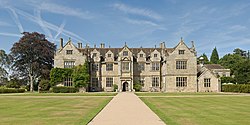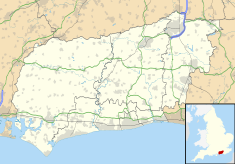
Wakehurst Place

| Wakehurst Place | |
|---|---|
 Wakehurst Place house | |
| Type | Country house estate |
| Coordinates | 51°04′02″N 0°05′20″W / 51.06720°N 0.08894°W |
| OS grid reference | TQ 33950 31418 |
| Area | West Sussex |
| Built | 1590 |
| Governing body | Royal Botanic Gardens, Kew |
| Owner | National Trust |
Listed Building – Grade I | |
| Official name | Wakehurst Place |
| Designated | 28 October 1957 |
| Reference no. | 1025764 |
| Official name | Wakehurst Place |
| Designated | 1 June 1984 |
| Reference no. | 1000189 |


Wakehurst, previously known as Wakehurst Place, is a house and botanic gardens in West Sussex, England, owned by the National Trust but used and managed by the Royal Botanic Gardens, Kew (RBG Kew). It is near Ardingly, West Sussex in the High Weald (grid reference TQ340315), and comprises a late 16th-century mansion, a mainly 20th-century garden and, in a modern building, Kew's Millennium Seed Bank. Visitors are able to see the gardens, the mansion, and also visit the seed bank. The garden today covers some 2 km2 (490 acres) and includes walled and water gardens, woodland and wetland conservation areas.

RBG Kew has leased the land from the National Trust since 1965 and much has been achieved in this time, from the Millennium Seed Bank project and the creation of the Loder Valley and Francis Rose Nature Reserves to the introduction of the visitor centre, the Seed café and Stables restaurant, along with the development of the gardens.

Wakehurst is listed Grade I on the National Heritage List for England, and its gardens are listed Grade II* on the Register of Historic Parks and Gardens.[1][2]

The stables are listed Grade II* and the South Lodge and gateway is listed Grade II.[3][4]

History
The mansion was built by Sir Edward Culpeper in 1590. It originally formed a complete courtyard prior to being altered various times, and currently has an E-shaped plan. Wakehurst was bought in 1694 by Dennis Lyddell, comptroller of the Royal Navy treasurer's accounts and briefly MP for Harwich. His son Richard Liddell, Chief Secretary for Ireland and MP for Bossiney, was obliged by financial pressure to pass the estate to his younger brother Charles.[5]

The house was illustrated in Joseph Nash's The Mansions of England in the Olden Time (1839–49).

The gardens were largely created by Gerald Loder (later Lord Wakehurst) who purchased the estate in 1903 and spent 33 years developing the gardens.[6] He was succeeded by Sir Henry Price, under whose care the Loder plantings matured. Sir Henry left Wakehurst to the nation in 1963 and the Royal Botanic Gardens took up a lease from the National Trust in 1965.

In 1887, American architect Dudley Newton completed a replica of Wakehurst in Newport, Rhode Island, for sportsman and politician James J. Van Alen from plans designed by Charles Eamer Kempe. Salve Regina University purchased the mansion from the Van Alen family in 1972.[7]

In 2022, the mansion was closed for an extensive renovation, predicted to last at least two years.[8]

National Collections
Wakehurst is home to the National Collections of Betula (birches), Hypericum, Nothofagus (Southern Hemisphere beeches) and Skimmia. The Great Storm of 1987 decimated Loder's plantings, toppling 20,000 trees.[9] Since then, Kew has redesigned the gardens to create a walk through the temperate woodlands of the world.[10]

Millennium Seed Bank
The Wellcome Trust Millennium Building, which houses an international seed bank known as the Millennium Seed Bank (run by Kew, not the National Trust), was opened in 2000. The aim of the Millennium Seed Bank is to collect seeds from all of the UK's native flora and conserve seeds from 25% of the world's flora by 2020, in the hope that this will save species from extinction in the wild.[11]

Nearby, also cared for by Kew, are the Loder Valley Nature Reserve of woodland, meadowland and wetland habitats, and the Francis Rose Reserve, the first devoted to cryptogams (mosses, lichens and ferns).[citation needed]

Christmas tree
Wakehurst is home to the largest growing Christmas tree in England, a giant redwood. The tree stands 35 metres (115 ft) tall and is lit with around 1,800 lights from Advent until Twelfth Night.[12] The lightbulbs on the tree were changed in 2006 to energy-saving lightbulbs, so the tree is not as bright as before but uses less energy.[citation needed]

In popular culture
Much of Kenneth Branagh's 2006 film As You Like It, adapted from Shakespeare's play, was filmed on location at Wakehurst.[13]

On 4 June 2021, the BBC broadcast an episode of Gardeners' World from Wakehurst.[14]

See also
References
- ^ Historic England (28 October 1957), "Wakehurst Place (1025764)", National Heritage List for England, retrieved 11 March 2018
- ^ Historic England (1 June 1984), "Wakehurst Place (1000189)", National Heritage List for England, retrieved 11 March 2018
- ^ Historic England, "The South Lodge and Gateway, Wakehurst Place (1025765)", National Heritage List for England, retrieved 11 March 2018
- ^ Historic England (28 October 1957), "Stables to the north east of Wakehurst Place (1354792)", National Heritage List for England, retrieved 11 March 2018
- ^ "Liddell, Richard (?1694–1746), of Wakehurst Place, Suss". History of Parliament Online. Retrieved 25 June 2014.
- ^ "Wakehurst Place: The Culpeper Connection".
- ^ Salve Regina University. "Campus Buildings: Wakehurst". Retrieved 6 July 2016.
- ^ "The Mansion: Undergoing restoration". Archived from the original on 18 January 2023. Retrieved 18 January 2023.
- ^ Royal Botanic Gardens Kew, Souvenir Guide, 4th ed. 2009:81.
- ^ "What's in the gardens". Retrieved 9 November 2022.
- ^ "Royal Botanical Gardens Kew: Seed Collection". Retrieved 17 February 2020.
- ^ "'Biggest Christmas tree' lit up". BBC News. 26 November 2004. Retrieved 26 June 2014.
- ^ "As You Like It". British Universities Film and Video Council. Retrieved 17 December 2018.
- ^ "Gardeners' World Episode 12". British Broadcasting Corporation. Retrieved 4 June 2021.
External links
- Wakehurst: National Trust
- Wakehurst: Royal Botanic Gardens, Kew
- Visit Wakehurst
- What's on at Wakehurst

- 1590 establishments in England
- Ardingly
- Botanical gardens in England
- Country houses in West Sussex
- Gardens in West Sussex
- Grade I listed houses
- Grade II listed buildings in West Sussex
- Grade II* listed buildings in West Sussex
- Grade II* listed parks and gardens in West Sussex
- Houses completed in 1590
- National Trust properties in West Sussex
- Royal Botanic Gardens, Kew
- Tourist attractions in West Sussex
- Tudor architecture
- Woodland gardens
See what we do next...
OR
By submitting your email or phone number, you're giving mschf permission to send you email and/or recurring marketing texts. Data rates may apply. Text stop to cancel, help for help.
Success: You're subscribed now !

